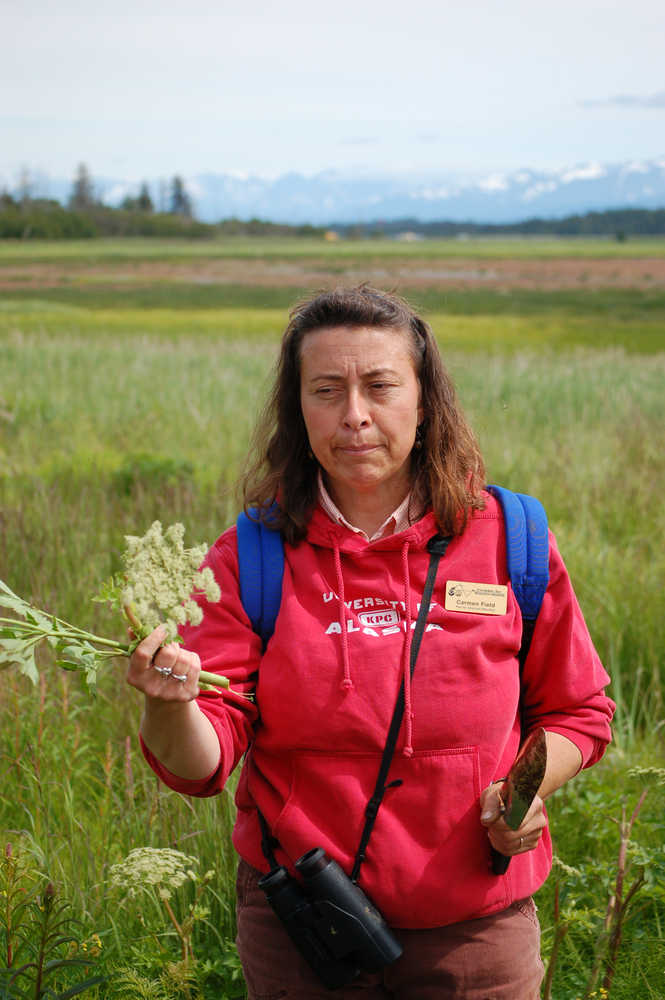A longtime environmental educator who taught everyone from children to seniors, and everywhere from outdoors to the classroom, has been honored with the Alaska Conservation Foundation’s Jerry Dixon Award for Excellence in Environmental Education.
Carmen Field, 53, who died May 31, 2016, received word the day before she died that she would get the award. Her husband, Conrad Field, and daughter, Eryn Field, will receive the $1,000 award on her behalf at a ceremony in late September.
“She had an uncanny ability to connect with every person that she talked to, and it didn’t matter if it was one-on-one or a group,” said Terry Thompson, a friend and coworker at the Alaska Department of Fish and Game. “People were just totally enthralled. Not only did she make them feel she was talking directly to them, but she was able to take the natural world and the science and make it relevant to them.”
Thompson was one of several people who nominated Field for the Dixon Award. Her main nominator was Daisy Lee Bitter, who won the award in 2011. Bitter had planned to deliver the news to Field in person before she died. Field was diagnosed with breast cancer in 2013, and her cancer had returned earlier this year. The Alaska Conservation Foundation knew of the recurrence, said Marilyn Sigman, vice president of the ACF board of trustees and an awards committee member.
“When we reviewed the candidates we had, she was clearly someone who deserved the award,” Sigman said.
The Dixon award is named after Jerry Dixon, a McAuliffe fellow and former teacher of the gifted in Seward. The award honors “innovative educators who integrate stewardship of Alaska’s natural environment into their instructive efforts,” as the ACF describes it.
“The award is about conservation,” Sigman said. “This really was on behalf of the conservation community for the work she’s done on behalf of conservation with her teaching.”
Field’s work as an educator goes back to before she settled in Homer with Conrad Field. She worked as an interpreter at the Alaska Zoo in Anchorage, and taught marine ecology at Jekyll Island, Ga. In Homer, she and her husband were naturalists at Kachemak Bay Wilderness Lodge. They also did tours for Zegraham Expeditions to Antarctica, Norway and other exotic natural locations.
Field also helped start the Kachemak Bay Shorebird Festival and Nature Rocks, a program to get children involved in nature. As an example of how she could make science accessible in humorous ways, she and her husband also helped found the International Bird Beer Label Association, where people seek out beer labels with bird images — and then might go on to become birders.
In Homer, Field worked as a seasonal employee with the Alaska National Wildlife Maritime Refuge and since 1999 worked for the Kachemak Bay Research Refuge as an educational associate. When KBRR moved from Fish and Game to the University of Alaska Anchorage, Field stayed on as an aquatic education specialist through Fish and Game.
Hundreds of visitors met Field as one of the guides leading things like ecology walks along Beluga Slough. She was an affable guide not afraid to step off the boardwalk and into the mud and get her hands dirty. Field also led Discovery labs for KBRR at the Alaska Islands and Ocean Visitor Center, where she had a gift for inspiring kids about science. Field didn’t talk down to children, Thompson said. Field’s daughter, Eryn, is a good example of that, he said.
“She and Conrad never talked baby talk to Eryn,” he said. “Now, she can lead tours out on the boardwalk any day.”
Field also knew how to talk to her elders, Thompson said.
“It didn’t matter the age. She could talk to a senior and then all of sudden make the world come alive to them,” he said.
Field taught marine invertebrates and marine seabirds at Kachemak Bay Campus starting in 1998, teaching her last class in the fall of 2015. Before that Field also taught Elderhostel classes for about 15 years, said KBC director Carol Swartz.
“She was a true educator. She wasn’t just a teacher — she was a natural educator,” Swartz said. “She shared an appreciation for learning through what she said and how she said it. Not everyone has that gift.”
Field also could inspire adults with the sense of wonder about the world, Swartz said.
“A lot of adults lost our sense of wonder,” she said. “She really gave people that wonder. If was like she was talking for the first time when you knew she taught the class over and over.”
Sigman, who knew Field from when Sigman was the executive director of the Center for Alaska Coastal Studies in Homer, said even though she knows a lot about science and intertidal ecology, she considered the Fields her teachers.
“She was always ahead of me. I’d find something new and Carmen would say, ‘I knew that,’” Sigman said. “What was so impressive about her as a teacher, she was so inspired herself by what she was learning and knew. She passed that on.”
Swartz noted how Field served as a mentor to other teachers she taught — like throwing a pebble in a pond and how the circles go on forever, she said.
Thompson said Field also became a role model for young scientists.
“All you have to do is look at kids in Homer,” he said. “There’s such a cohort of kids who now are going into science and becoming such strong stewards of the natural world. A lot of that you can point back to Carmen.”
Sigman said it’s great that people are recognizing Field’s work now that she’s gone. Field would have been embarrassed to get the award, though, she said.
“It wasn’t about being the best or getting the awards,” Sigman said. “Teaching, that was her passion.”
Michael Armstrong can be reached at michael.armstrong@homernews.com.


